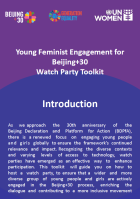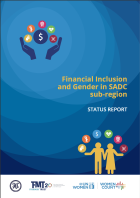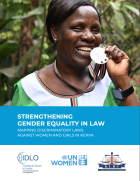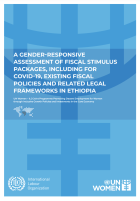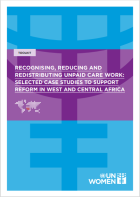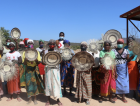1 - 20 of 22 Results
Pagination
Date:
Discover the key insights and milestones of the Beijing Declaration and Platform for Action (BPfA) as we approach its 30th anniversary in 2025. This publication explores progress made, persistent challenges, and Kenya’s contributions to gender equality. Highlighting actionable steps for individuals and organizations, it connects the BPfA to the Sustainable Development Goals, emphasizing its continued relevance in driving transformative change for women and girls globally.
Date:
The Beijing Declaration and Platform for Action (BDPfA) is a landmark global commitment, adopted by 189 countries in 1995, to advance gender equality, eliminate discrimination, and empower all women and girls.
Date:
This Care Framework highlights the context and challenges of women's unpaid care work in the West and Central Africa region. It also describes UN Women's approach to the care economy to address unpaid care within the context of the SDGs and the polycrisis in the region, and enabling gender equality and economic justice for rural and poor women.
Date:
Women’s economic empowerment, financial independence, power and agency are facilitated through financial inclusion, using financial services and managing their own incomes. Empowering women economically drives social progress and mobility as women tend to invest their money in education and health. Financial inclusion also plays a pivotal role in achieving Agenda 2030.
Date:
UN Women and International Development Law Organization (IDLO), in partnership with the Kenya Law Reform Commission. Researcher/writer: Dr. Consolata Ngondi; Ms. Petronella Mukaindo
Date:
This advocacy notes outlines the most recent data on women's access to finance in Africa and indicates what policymakers, civil soiety organisation and financial institutions can do to improve women entrepreneurs' situation in accessing green finance.
Date:
This publication summarises the analysis of gender equality in Zanzibar, focusing on areas ranging from gender and poverty to gender, peace and security.
Date:
This publication analyses and provides the state of policy, legal, and institutional frameworks for promoting the rights, opportunities, and welfare of men and women in the country.
Date:
The purpose of this publication is to survey the existing official statistics, gender analyses, and country reports to provide updated information on the state of gender equality, focusing on what has been done, what needs to be done, and what approaches need to be scaled up.
Date:
GENDER RESPONSIVENESS OF STIMULUS PACKAGES, FISCAL POLICIES AND RELATED LEGAL FRAMEWORKS IN ETHIOPIA-POLICY BRIEF
Date:
The objective of the study is to assess the gender responsiveness of national fiscal stimulus packages including COVID-19 and existing fiscal policies in support of gender-equitable inclusive growth in Ethiopia. The study identifies how women and men are impacted differently and what this implies for the design of policy and choice of approach in responding to crisis and implementing macroeconomic polices.
Date:
Unpaid care work by women is one of the most important constraints they face in running their businesses or advancing in their careers. This toolkit presents a compilation of case studies that have been selected to support governments and civil society in dialogue around the implications of unpaid care work on women’s lives and countries development outcomes and for positioning (unpaid) care reform in a more central role in policies in the region.
Date:
Women’s unpaid care responsibilities are one of the main barriers preventing women from fully profiting from new jobs created in the green economy and is limiting their contribution to climate change mitigation and adaptation. Therefore, this brief calls for action on adopting appropriate public policies to ensure that women get an equitable share of green jobs; balancing men’s and women’s responsibilities for care; supporting private sector development in the care sector to scale-up promising solutions and increasing access to time-saving and energy-efficient infrastructure.
Date:
The purpose of this booklet is to raise awareness on the African Continental Free Trade Area (AfCFTA) among stakeholders in Zimbabwe, especially women traders. It is intended to facilitate information on opportunities and benefits provided by AfCFTA that women in trade can exploit and use, in pursuit of their business goals whether formally or informally.
Date:
The policy brief aims to serve as an synthesizes and presents key findings from UN Women-led research; regional online surveys and; advocacy on. making the AfCFTA work for (young) women and (young) women-led businesses, both in the design and implementation of gender-responsive AfCFTA policy reforms and complementary measures, as well as in the soon-to-be negotiated AfCFTA Protocol on Women and Youth in Trade.
Date:
The UN Women WCARO annual report aims to share information about the regional office's activities on women empowerment and gender equality in 2020. The said year has been a particularly difficult year around the world with the COVID-19 pandemic. In West and Central Africa (WCA), women and girls were particularly vulnerable to the crisis. To counter these burdens and build medium and long- term recovery measures, the UN Women WCA Regional Office successfully provided multi-faceted assistance...
Date:
The UN Women Tanzania study involved desk review, key informant interviews with the government and CSOs, an analysis of the literature of relevant laws and policies on customary practices as well as a review of land governance and land administration practices in Tanzania was done in August 2017. The study also highlights recommendations to advance women's land rights and tenure security in the context of SDGs.
Date:
The African Continental Free Trade Area (AfCFTA) an opportunity for growth and prosperity in Africa. However, because of pre-existing inequalities in African economies, the agreement’s benefits will not be distributed equally along gender lines. As the AfCFTA Secretariat is starting to draft a Women in Trade Protocol, it is important that women across the continent participate actively in the process to voice their views, interests, and needs. This advocacy brief highlights 9 important...
Date:
EMPOWERING WOMEN THROUGH CLIMATE-RESILIENT AGRICULTURE IN WEST AND CENTRAL AFRICA - KEY RESULTS OF UN WOMEN’S FLAGSHIP PROGRAMME
View online/download
Order printed/published version
Languages available: EN
Date:
The policy paper assesses the state of Gender Based Violence (GBV) in Africa in the context of the COVID-19 pandemic. Informed by evidence from the five African Union (AU) regions, it outlines some of the initiatives implemented in AU Member States. The paper also proposes recommendations towards multi-sectoral response and recovery efforts that address GBV as well as the related needs of women and girls in Africa.


